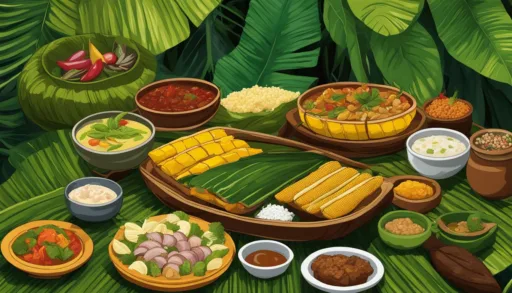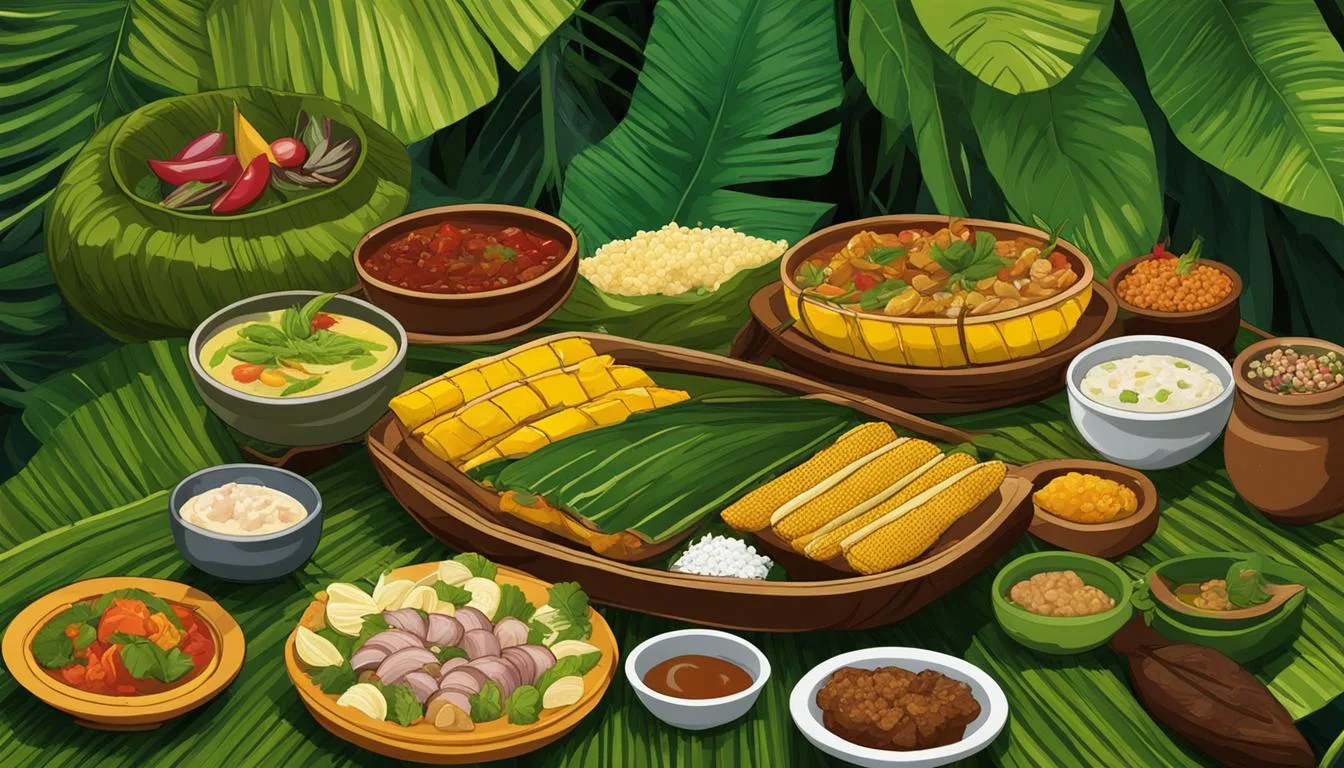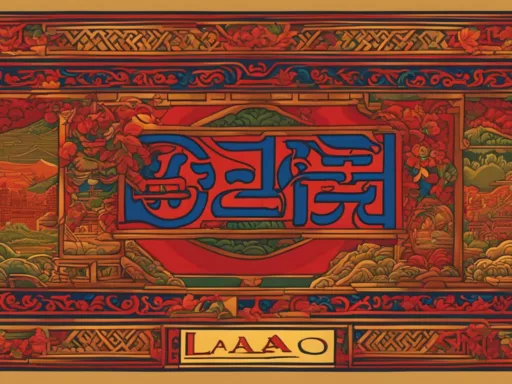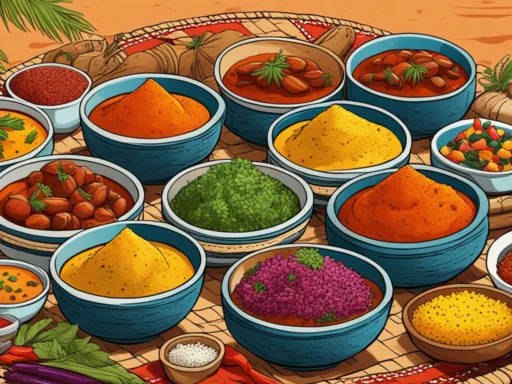With an estimated 80% of its landmass covered by rainforests, Gabon is a treasure trove of biodiversity that extends to its extraordinary culinary landscape. Yet, despite its lush environment, Gabon’s flavorsome cuisine remains a hidden gem to many food enthusiasts. This gastronomic haven rich with traditional dishes from Gabon ribbons through the heart of Central Africa, waiting to be discovered by connoisseurs seeking a unique taste adventure. Serving as your Gabonese Food Guide, join us on an exploration into the Gabonese cuisine—a journey peppered with Gabonese culinary delights that are as rich and diverse as the terrain from which they spring.
Key Takeaways
- Gain insight into traditional dishes from Gabon that showcase the nation’s rich biodiversity.
- Understand the unique aspects of Gabonese cuisine within the broader scope of African culinary traditions.
- Discover the historical and cultural significance behind Gabonese culinary delights.
- Learn key elements of the Gabonese Food Guide to savor authentic flavors.
- Find inspiration to delve deep into the world of Gabonese cuisine, a lesser-known but captivating gastronomic culture.
Tracing the Roots of Gabonese Cuisine
The culinary tapestry of Gabon is woven with an incredible variety of ingredients, each contributing to the rich and unique flavors that define Gabonese food culture. From the fertile soil of its rainforests to the bountiful Atlantic coast, Gabon is home to numerous ingredients that are cornerstones of its traditional dishes. As we delve into the mainstays of Gabonese cuisine, we uncover the secrets behind some of the best foods in Gabon.
Ingredients Defining Gabonese Cooking
Gabon’s natural resources provide a plethora of ingredients that form the essence of its culinary identity. Root vegetables like yams and the multipurpose plantain are just the beginning of the journey into Gabonese gastronomy. Okra, used for its thickening properties, and a range of spices, bring both body and aromatic warmth to the regional dishes.
Poulet Nyembwe: A National Classic
At the heart of traditional dishes from Gabon sits Poulet Nyembwe, a celebrated dish that captivates both locals and visitors. Its defining characteristic, the rich palm nut sauce, is a vibrant testament to Gabonese food culture, embodying the deep, earthy flavors prevalent throughout the country’s cuisine.
Saka-Saka: The Versatility of Cassava Leaves
Saka-Saka, a beloved preparation of cassava leaves, embodies the inventive spirit of Gabonese chefs. This dish highlights the versatility of cassava—an ingredient that’s a staple in many African countries and exemplifies the ingenuity of Gabonese cuisine. Often paired with fish or meat, Saka-Saka is a true reflection of Gabon’s natural abundance and culinary creativity.
Let us not forget the visual and flavorful experience provided by these dishes. Take a moment to savor the colors and textures with this enticing image:
What sets Gabonese cuisine apart is not merely the selection of its ingredients but the careful and respectful way in which they are combined. It is a cuisine that not only nourishes but also tells a story of a people and their relationship with the land. Join us as we continue to explore the roots and delights of Gabon’s wonderful culinary heritage.
A Panoramic View of Gabonese Food Culture
The story of Gabonese food culture is long and rich, a celebration of flavors that span a wide palatial horizon. It is a culture marked by Gabonese cooking traditions that resonates through time, reflecting the nation’s diverse history, its abundant natural resources, and the intimate connection of its people to the land. Gabonese culinary delights are not just meals; they are narratives of cultural evolution, resilience, and a shared sense of community wrapped into an indulgent culinary experience.
Each dish in the Gabonese repertoire is more than a mere entrée; it is a testament to Gabonese cooking traditions. These practices have been preserved and passed down through generations, a testament to the reverence held for their time-honored gastronomic heritage. Below is a list that offers a glimpse into the core of Gabonese cuisine:
- Poulet Nyembwe: A prime example of indigenous influences meeting the bounties of Gabon’s lush forests, showcasing the traditional usage of red palm nut sauce.
- Fumbwa: An eloquent expression of Gabon’s edible greenery, paired often with smoked fish or meat.
- Bushmeat: A controversial yet integral part of the food culture, highlighting the hunting skills intrinsic to Gabonese history.
- Seafood: With its extensive Atlantic coastline, Gabon’s cuisine benefits from a plethora of fresh fish and shellfish, brought to life with local spices and herbs.
These dishes and ingredients are mirrors reflecting the life and soul of Gabonese communities. Delving into Gabonese cuisine is akin to exploring a world where every bite tells a unique story – from the bustling markets of Libreville to the quiet, smoke-filled kitchens of traditional homes. The undeniable charm of Gabonese culinary delights lies in their ability to connect us with narratives of times past and present, comprised of flavors that linger long after the meal is done.
Gabonese Culinary Delights: Rich Flavors and Techniques
The cuisine of Gabon tantalizes the palate with its complexity and depth, inviting a gastronomic exploration of texture and taste. At the heart of this culinary tradition lies the vibrant and aromatic red palm nut sauce, a cornerstone of Gabon’s food heritage. To truly appreciate the skill behind these popular Gabonese recipes, one must delve into the traditional cooking methods in Gabon that have been passed down through generations.
Red Palm Nut Sauce: The Heart of Gabonese Flavor
Embodying the essence of Gabonese cuisine, the red palm nut sauce is beloved for its rich, earthy flavor profile. This versatile condiment is a staple in many homes and a foundational ingredient in a myriad of traditional dishes. Here’s a closer look at the red palm nut sauce’s role in Gabonese cooking:
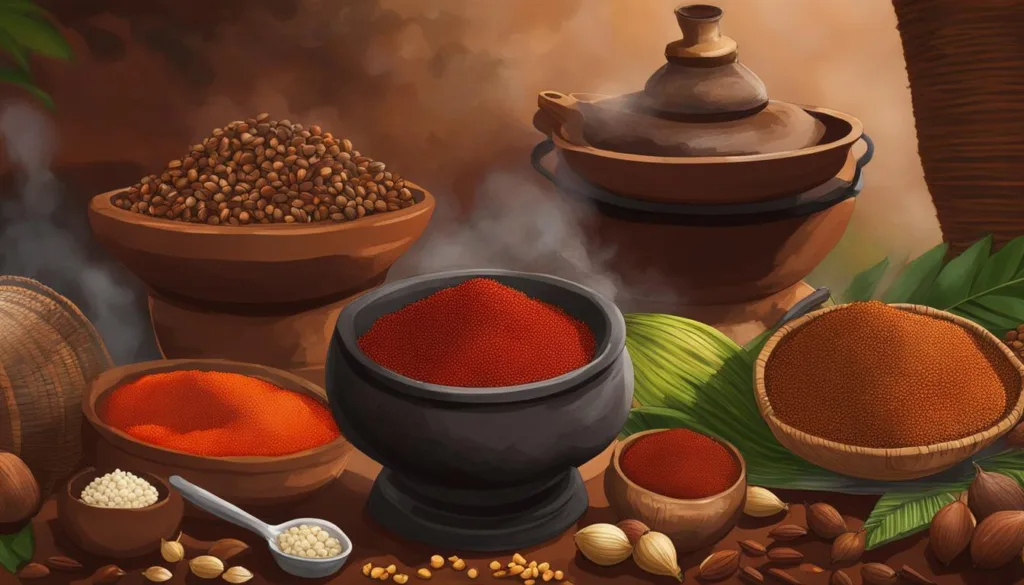
Famed for its robust taste, red palm nut sauce serves as both a base and an enhancer. It seamlessly infuses a touch of Gabonese authenticity into every dish it graces, from succulent meats to hearty stews. The labor-intensive process of extracting the essence from the palm nuts reflects a dedication to preserving cultural flavors and demonstrates a unique aspect of Gabonese culinary expertise.
Traditional Cooking Methods in Gabon
Permeating the kitchens of Gabon is an array of time-honored cooking techniques. These methods mirror the landscape’s natural offerings and underscore the cultural significance of every meal shared among friends and family.
| Cooking Method | Ingredients Typically Used | Dishes Enhanced |
|---|---|---|
| Braising | Chicken, fish, beef, and assorted vegetables | Poulet Nyembwe, Mustard Chicken |
| Steaming | Leafy greens, yams, plantains | Manioc Leaf Stew, Fumbwa |
| Smoking | Fish, bushmeat | Smoked Fish, Smoked Pork |
| Stir-frying | Vegetables, meats, spices | Moukalou, Saka-Saka |
Traditional methods like braising and steaming are favored for the succulence and tenderness they impart. Smoking, on the other hand, is an art form that adds a deeply satisfying smoky flavor, transforming simple ingredients into mouth-watering feasts. Finally, the rapid movement of stir-frying keeps the vibrant hues and crunch of vegetables intact, creating dishes that are as pleasing to the eye as they are to the palate.
Sampling Traditional Dishes from Gabon
Welcome to the eclectic world of Gabonese cuisine, where every dish tells a story of culture, environment, and culinary innovation. As we delve into the traditional dishes from Gabon, our palates are greeted with a harmony of flavors that can only be found within the lush landscapes of this equatorial nation. For those seeking a comprehensive Gabonese food guide, we’ve compiled a list of some of the best foods in Gabon to savor.
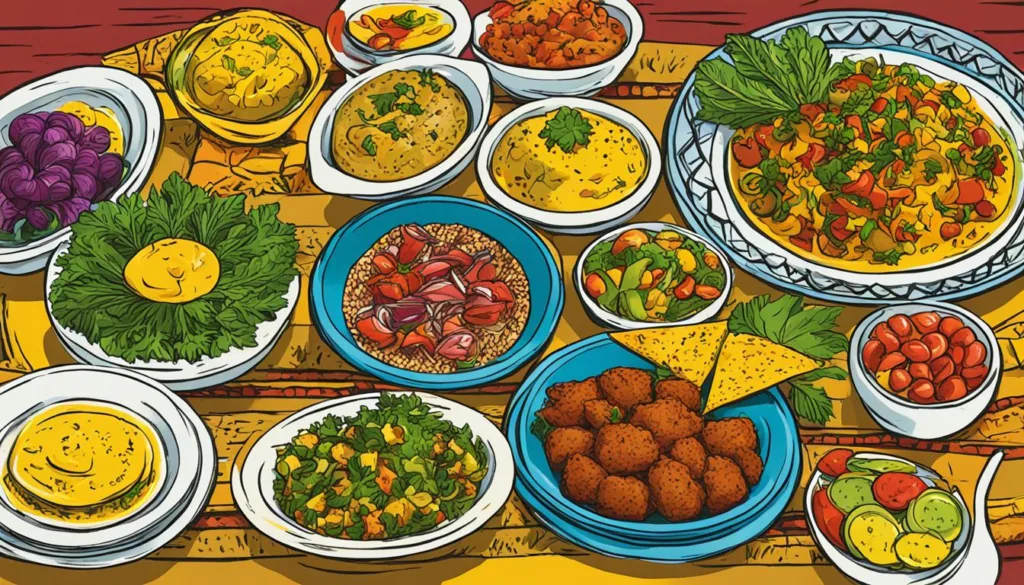
The centerpiece of any Gabonese feast is undoubtedly Poulet Nyembwe, a dish celebrated for its rich, nuanced flavors. Another staple is Saka-Saka, an ingenious use of cassava leaves, illustrating the versatility of this ever-present African ingredient. These dishes are steeped in tradition and are a reflection of Gabon’s biodiverse splendor.
| Dish Name | Main Ingredients | Taste Profile | Cultural Significance |
|---|---|---|---|
| Poulet Nyembwe | Chicken, Red Palm Nut Sauce | Savory and Rich | National dish, represents the essence of Gabonese flavors |
| Saka-Saka | Cassava Leaves, Palm Oil, Fish or Meat | Earthy and Hearty | Exemplifies the resourcefulness of Gabonese cooking |
| Fumbwa | Wild Spinach, Peanut Butter, Meat or Fish | Bold and Nutty | A reflection of the country’s love for leafy greens and nuts |
| Nyembwe Chicken | Chicken, Okra, Aubergine, Spices | Spicy and Tender | Demonstrates the fusion of indigenous ingredients and cooking methods |
These dishes provide just a glimpse into a rich tapestry of tastes that are waiting to be discovered. The Gabonese food guide is your gateway to exploring the cultural depth and delicious complexity of Gabonese cuisine. As we continue this journey across Gabon’s culinary landscape, be prepared for a seamless blend of tradition, taste, and tropical bounty at every turn.
Popular Gabonese Recipes for Home Chefs
Embracing the essence of Gabonese cooking traditions can be a delightful adventure for home chefs. With a few key ingredients and a passion for exploring new culinary landscapes, you can recreate the vibrant flavors of Gabon in your own kitchen. From the celebrated Gabonese Poulet Nyembwe to the staple dish of Saka-Saka, these popular Gabonese recipes offer a glimpse into the country’s rich and diverse food culture.
How to Make Gabonese Poulet Nyembwe at Home
No exploration of Gabonese cuisine would be complete without tackling Poulet Nyembwe, Gabon’s national dish. This rich and hearty meal features succulent chicken simmered in a fragrant sauce of red palm nuts—a staple in West African cooking. With dedication and the right ingredients, bringing this quintessential Gabonese recipe to your dining table is a rewarding culinary achievement. Below is a simple version for an authentic taste of Gabonese heritage in your own home.
- Cleaned and cut chicken pieces
- Red palm nut paste, available at specialty food stores
- Chopped onions and garlic for that aromatic base
- Spices such as West African pepper and a hint of salt
- Fresh herbs like basil and bay leaves for an added depth of flavor
By combining these ingredients and simmering them together, you can capture the essence of classic Gabonese Poulet Nyembwe.
Cooking Saka-Saka: A Step-by-Step Guide
Saka-Saka, another cornerstone of Gabonese fare, showcases the leafy green versatility of cassava leaves. This dish, often served over rice or used as a savory accompaniment, is a comforting staple bursting with nutrients. Here’s how to bring the rich green tapestry of Saka-Saka’s flavors to life:
- Pound or blend fresh cassava leaves into a fine paste.
- Braise onions and oil in a pot, laying the foundation of flavor.
- Gradually incorporate your cassava leaf paste and preferred stock.
- Simmer the mixture, allowing the flavors to marry beautifully.
- Adjust seasoning with salt, pepper, and a touch of chili for heat.
With these simple steps, you can serve a true Gabonese delight right from your own kitchen.
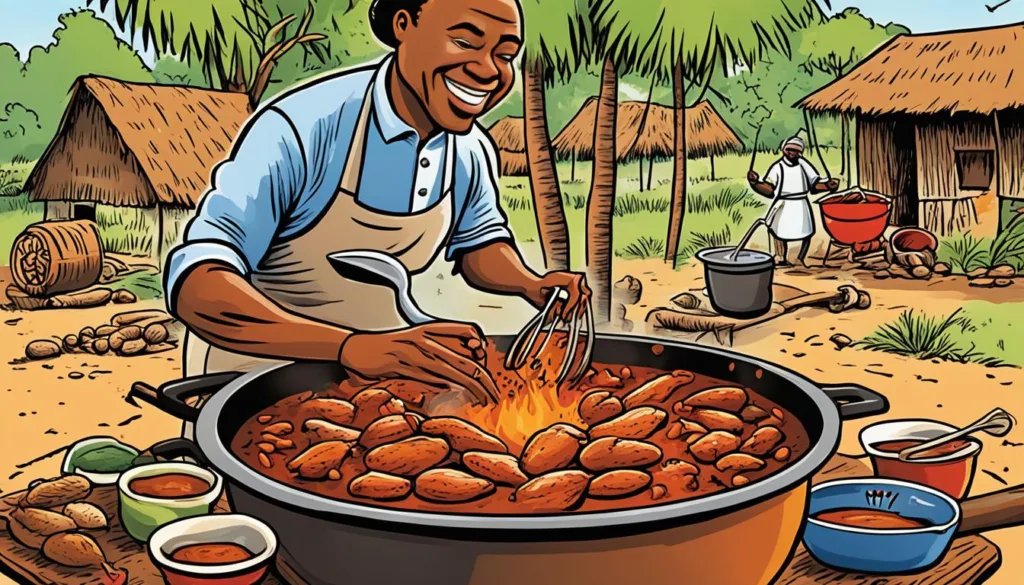
Fusion Flavors: The Impact of the Global Black Community on Gabonese Cuisine
The vibrancy of Gabonese food culture is a testament to the diverse tapestry of influences that characterize this colorful culinary landscape. Gabonese cuisine has magnificently woven together the recipes and ingredients borne from the global Black community to create a food experience that’s uniquely rich and diverse. With every dish served, there’s a story that contributes to culinary storytelling through Gabonese food.
Culinary exchanges as a result of migrations and the African diaspora have introduced a variety of techniques and traditions that blend seamlessly with the indigenous flavors of Gabon. These contributions have magnified the essence of original Gabonese recipes, infusing them with nuances that capture a range of cultural experiences.
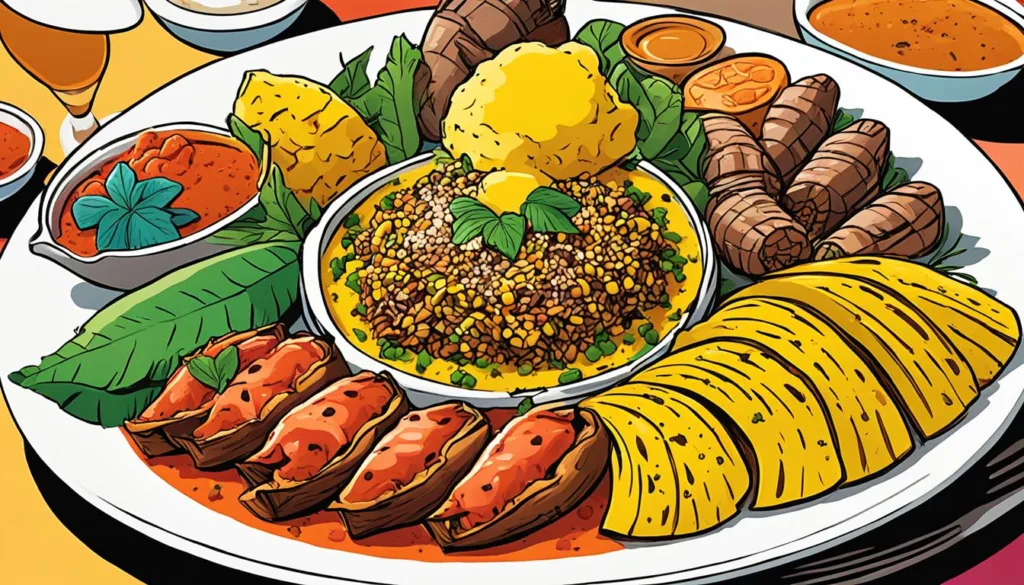
Reflecting the culinary dynamism, Gabonese cooks have become adept storytellers, using their plates as canvases to narrate the intercontinental journey of their gastronomic heritage. Below is an illustration of the typical elements found in Gabonese dishes that embody the fusion of local and diaspora-influenced flavors.
| Local Ingredient | Diaspora Influence | Fusion Dish |
|---|---|---|
| Cassava | Caribbean Spices | Cassava Balls with Spicy Mango Dip |
| Freshwater Fish | Creole Seasoning | Fish Stew à la Gabonaise |
| Red Palm Oil | West African Smoked Fish | Smoked Fish Palmoil Soup |
| Plantains | Brazilian Cachaca | Caramelized Plantains with Cachaca Sauce |
In essence, the influence of the global Black community has not overshadowed traditional Gabonese tastes but has played a pivotal role in enriching it. Through imaginative pairings, Gabonese cuisine continues to flourish, harnessing both history and modernity, and fiercely preserving its culinary identity all while embracing innovation. This exchange fosters not just the enduring legacy of the cuisine but stands as a beacon of unity amongst cultures through the universally cherished act of sharing a meal.
Gabonese Cooking Traditions and Their Culinary Significance
Gabonese cooking traditions reach deep into the heart of African culinary practices. These time-honored methods embody more than just a method for preparing food; they are a testament to the nation’s reverence for its natural resources and communal spirit. The cuisine is a reflection of Gabon’s abundant biodiversity and the cultural narratives that have shaped its society over the centuries. This makes a Gabonese food guide an indispensable companion for anyone looking to explore the rich tapestry of flavors and customs that make up this unique culinary landscape.
The Legacy of African Techniques in Gabon
The craft of Gabonese cuisine is rooted in the utilization of vibrant and fresh ingredients found within its borders. From the fertile soil springs forth a bounty of produce that is deftly transformed by local cooks using age-old techniques. These methods, passed down from one generation to the next, are as much a part of the nation’s heritage as the stories and songs that accompany a communal feast.
Culinary Storytelling Through Gabonese Food
Culinary storytelling is an integral aspect of the food culture in Gabon. With each dish comes a narrative—a slice of history, a piece of cultural identity, or a familial memory. Through dishes like Poulet Nyembwe and Fumbwa, Gabonese cooks share their ancestry and communal bonds, providing a taste of tradition in the heart of Central Africa.
| Traditional Dish | Significance | Main Ingredients |
|---|---|---|
| Poulet Nyembwe | National dish representing the soul of Gabonese cooking traditions | Chicken, red palm nut sauce, spices |
| Fumbwa | A symbolic dish showcasing the forest’s offerings | Wild spinach, peanuts, smoked fish |
| Saka-Saka | An embodiment of sustainability and culinary resourcefulness | Cassava leaves, garlic, spices |
The Best Foods in Gabon: A Guide to Dining in Libreville
Embark on a gastronomic adventure in Libreville, Gabon’s bustling capital, where a plethora of dining options awaits. From the chic ambiance of high-end restaurants to the exuberant flare of street-side vendors, the city offers an experience that caters to all palates and preferences. As the heart of dining in Gabon, Libreville’s culinary scene is a genuine reflection of the country’s rich flavors and diverse food heritage.
Exploring Libreville’s Diverse Restaurants
Unveil the city’s vibrant mosaic of Libreville restaurants as you navigate through an array of cuisines that merge traditional Gabonese flavors with international influences. Each establishment presents a unique story, elegantly plated through signature dishes that celebrate the creative spirit of Gabon’s chefs. Whether seeking comfort at a local bistro or indulging in luxury at fine dining venues, every meal in Libreville enriches your understanding of the local culture and cuisine.
Street Food in Gabon: A Taste of the Local Scene
For an authentic taste of the everyday, immerse yourself in the spirited world of street food in Gabon. Sample an array of snacks and quick bites as you meander through vibrant markets and roadside stalls. Each vendor’s offering, from succulent grilled fish to fluffy beignets, captures the essence of Gabonese hospitality and culinary innovation, providing a genuine peek into the soul of the city’s food scene.
| Libreville Dining Highlight | Cuisine Type | Must-Try Dish |
|---|---|---|
| La Residence du Phare | Upscale Gabonese | Poulet Nyembwe |
| Marché de Mont-Bouet | Local Street Food | Grilled Fish and Plantains |
| Le Gourmet | International | Filet de Bœuf |
| Le Patio | French-Gabonese Fusion | Fricassée de Jacope |
| Les Paillottes | Local Seafood | The Seafood Platter |
Meeting the Chefs: Movers and Shakers of Gabonese Cuisine
The essence of Gabonese cuisine is its rich tapestry of taste and tradition—an art that is masterfully kept alive by the passionate chefs who are dedicated to both preserving heritage and pushing the boundaries of culinary innovation. Embraced by the verdant landscapes of Gabon, these culinary experts craft some of the most popular Gabonese recipes that encourage a food experience like no other, delighting locals and travelers alike with Gabonese culinary delights.
These skilled kitchen artisans are adept at combining the rustic charm of traditional ingredients with the sophistication of contemporary techniques. It’s through their hands that one can truly experience the heartbeat of the nation’s food scene: from the intricate layers of flavors in a Poulet Nyembwe to the refreshing zest of a Mustard Fish—each dish woven into the fabric of Gabon’s rich gastronomic tapestry.
- Adopting Global Influences: Many Gabonese chefs have embraced a global skill set while keeping the integrity of authentic flavors intact, resulting in a fusion that tells a story of both the past and the burgeoning food scene.
- Elevating Street Kitchen Staples: Inspired by the lively spirit of Gabon’s streets, their tireless innovation turns everyday meals into sublime experiences, spotlighting the very soul of Gabonese cuisine.
- Entrepreneurship and Outreach: Beyond the kitchen, these chefs contribute to culinary education and sustainable food practices, shaping a brighter future for Gabonese cuisine.
The kitchens of Gabon have become stages for culinary performance, with chefs acting as the masterful conductors of a grand and delicious symphony. Their relentless pursuit of culinary excellence continually enriches the food narrative, furthering Gabon’s reputation as a hub of gustatory marvels.
Let’s put a spotlight on the impactful contributions and the enduring legacy these chefs have put forth. They’re not just cooking; they’re curating epicurean journeys that stay with diners long after the last bite.
In saluting these frontrunners of Gabonese cuisine, we not only celebrate their extraordinary talents but also ensure the flourishing legacy of Gabon’s food culture. While the delicious complexity of dishes like Nyorog-no-ngen and Banana Gratin entice the palate, it is the spirit and dedication of these culinary artists that truly define the vibrant and evolving identity of Gabonese cuisine.
Gabonese Food Guide: Navigating the Culinary Landscape
For epicureans and travelers alike, a well-crafted Gabonese Food Guide is the compass by which one may traverse the vibrant gastronomic territory of this Central African nation. Gabon’s rich tapestry of flavors is steeped in tradition, melded with the dynamism of modern palates. Whether you’re savoring the succulent Poulet Nyembwe, relishing the hearty goodness of Saka-Saka, or exploring the subtleties of various fish dishes, the variety of Gabonese cuisine is bound to captivate your senses.
As you navigate through the cities, particularly Libreville, you’ll come to appreciate the breadth and depth of what qualifies as the best foods in Gabon. From high-end restaurants offering meticulously plated meals to the bustling markets presenting a rainbow of fresh produce and flavorsome street-food, each locale epitomizes a piece of the nation’s soul. The Gabonese Food Guide is your indispensable partner in seeking out these palate-pleasing experiences, ensuring you delve into the authentic essence of Gabon’s culinary scene.
The guide serves as not only a map to gastronomic hot spots but also an educational tool. It enlightens food lovers on the history behind the dishes, the local customs that surround eating, and the symbiotic relationship between the cuisine and the country’s social fabric. With this knowledge in hand, any culinary explorer can confidently step into the world of Gabonese cooking, partaking in a cultural ritual that is as much about community and continuity as it is about taste and technique.
